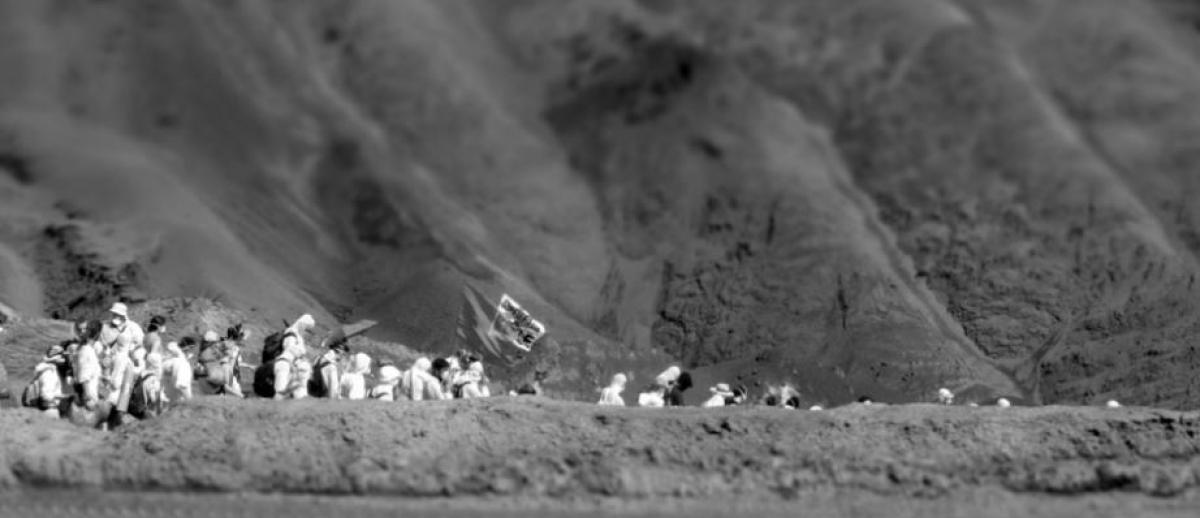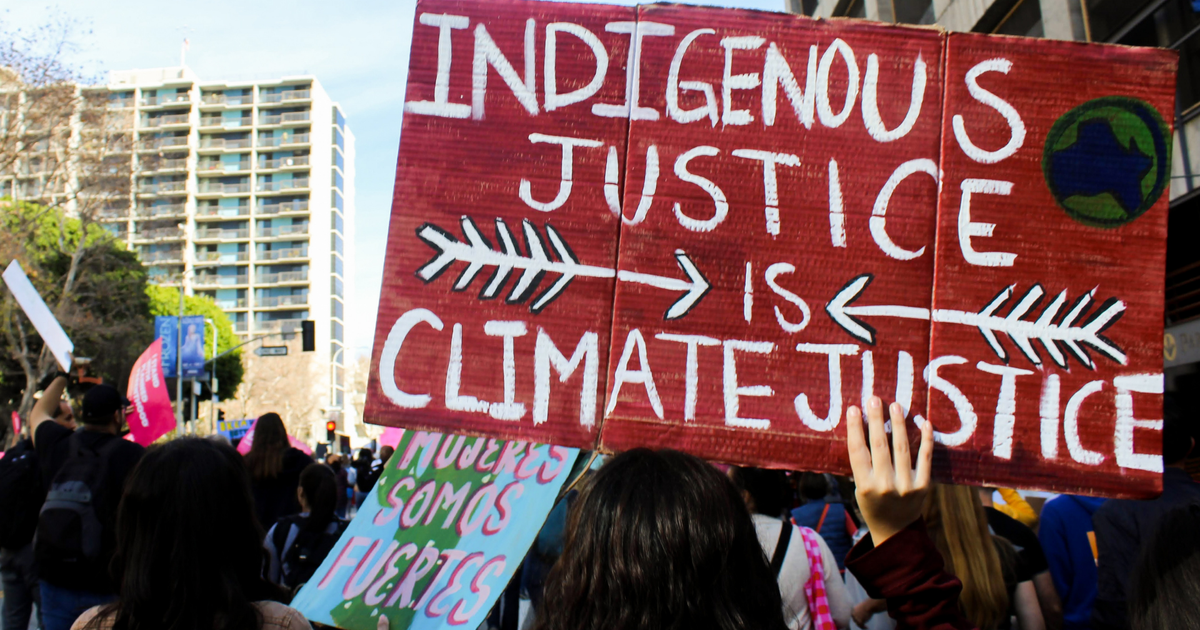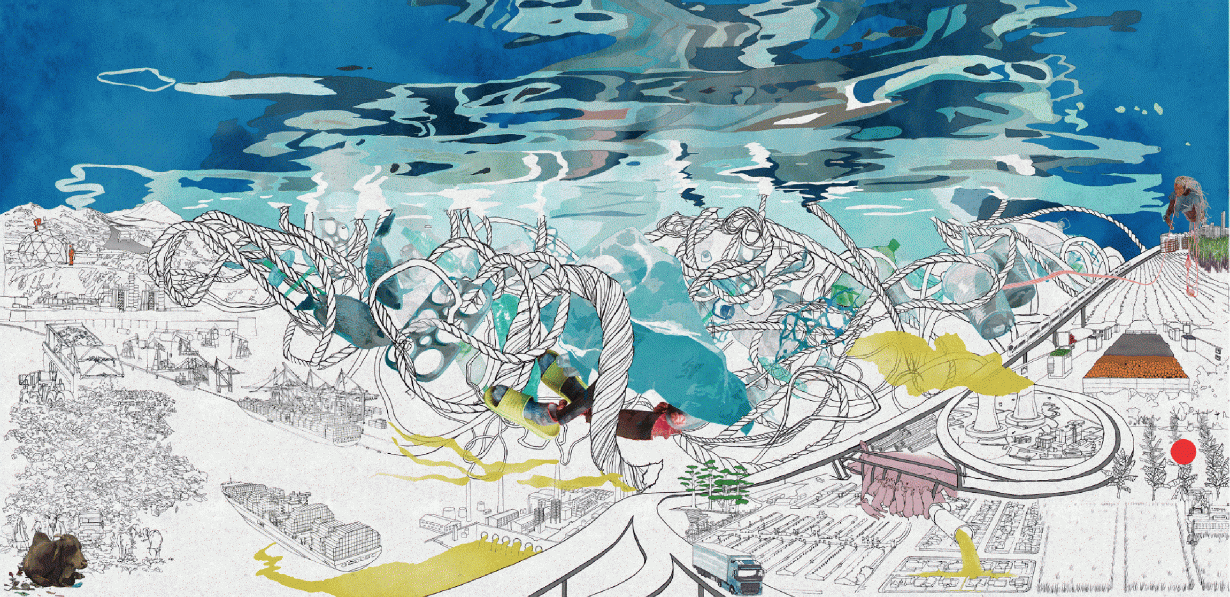Re-Globalization and Public Imagination
archive


Activists enter an open-pit coal mine in Germany as part of Ende Gelände's 2017 queer-feminist mass direct action. (Photo Credit: Kevin Buckland / Resilience)
Re-Globalization and Public Imagination
As of early 2023, with the tsunami tide of pandemic apparently receding, communities around the world continue to face countless, often seemingly intractable challenges in their local and national contexts. But two overarching existential precarities arguably still haunt the “post-Covid” global situation most globally, and press hard upon efforts such as those of Benedikter and Kofler (global-e 2019) to reimagine and remap globalization. In this essay I argue that forms and potentials of public imagination as shared by groups confronting the existential challenges of their time are at the heart of any possible transformative politics, and deserve sharper theoretical focus.
The accelerating conditions of the Anthropocene1 are the first global threat. They encompass not only climate change & climate justice struggles, energy and economic transition, environmental degradation and de-speciation, but a host of other problems including what one might call “virality politics.” By this I mean not just politically managing animal-to-human transmission of microbes due to increasing exposure as human populations impinge on previously undeveloped habitat, but polarized national public health responses due in part to anti-science bias among many citizens and the ways in which unchecked, fast-proliferating internet media messaging and image-making in the form of disinformation and conspiracy narratives pollute or dilute those society-level responses. (This is obviously a challenge pointing far beyond the single issue of pandemics.) The second overarching existential threat is the long-persistent scourge of nuclear weapons, which recently intrudes again into public consciousness since the 2022 Russian invasion of the Ukraine, subsequent nuclear saber rattling out of Russia, and related concerns with the Zaporizhzhia nuclear energy facility in the Ukraine combat zone. The March 2011 disaster in Fukushima, Japan is another stark reminder of the precarities and aporias bound up with the peaceful use of nuclear energy.2
The above cited constellations of issues pose planetary biotic and human civilizational threats that are being met with neither responsible political leadership nor sufficiently widespread public engagement, despite decades of committed activism among ever increasing numbers of people around the world. This is at core an issue of public imagination, and serious attention to public imagination needs to be at the center of theoretical and policy frameworks toward the planetary future. The reason is simple: imagination comes before political action, and, in the face of a market-driven global economic order and its perverse class structure, bureaucratic inertia, and widespread corruption, only sustained, bold political action can carry through toward tangible outcomes a sufficient reorientation of planet-wide human priorities.
Of course, rankings of the broad trends that loom most ominously over the global eco-social system will surely differ based on where one stands and what forms of knowledge are brought to bear upon them,3 and on this note voices from the global South must be privileged in all such discussions. Further complicating the picture, there can be no doubt that the ongoing creep of populist authoritarianism, nativism, racial and gender essentialism, and nascent fascist politics threatens democratic traditions and the rule of law around the world, posing a significant challenge to transformative politics everywhere.
Threat, Theory, and Imagination
Detecting global trends, assessing their implications, and debating possible corrections, as do Benedikter, Kofler, and their contributors in the global-e journal essay series on "five R’s of Re-Globalization" (among many others4), is of the highest importance. The reason I privilege the Anthropocene and nuclear threats has to do with how they point beyond national or even international political, social, cultural, and institutional arrangements toward ubiquitous “glocal” endangerment of the biological and geosystemic foundations of the earth itself – that is, beyond the merely human.
And it is here that perhaps the most profound revolution in human imagination is implicit, a basic shift in consciousness that points decisively beyond anthropocentrism. It suggests broad coalitions among worldwide movements of resistance, rights, and repair, but also suggest re- or post-humanization—humans as a species among species, multiform in expression, in critical tension with post- and trans-humanists’ focus on evolving technology. It implies, to borrow one of Bruno Latour’s coinages, a re-definition of humans among all living things on the planet, human and non-human, as “Earthbound” agents with no outside or other world to flee toward, and so with no choice but to set to work reshaping all eco-social relations.5

From this perspective, implicit in a world moment threatened by the hovering dread of the Anthropocene and nuclear annihilation is a human species consciousness: a public imagination that conceives both policy and polity from a post-nationalistic, non-anthropocentric, cooperative, mutually flourishing array of socio-political arrangements akin to what Anna Grear has called “ecological publics… of yet-to-be-imagined constituencies.” (Grear 70)
Why yet to be imagined? Part of the reason has to do with what Drucilla Cornell and Stephen D. Seely have called “political spirituality,” by which they mean “the way in which imaginations... should remain inherently open to challenge and change as we are affected differently the more we open ourselves to all others who surround us and share our world with us.” (Cornell and Seely 12) This points to a very specific political role of imagination, or what Chiara Bottici and others are calling the imaginal:
“If we understand ‘politics’ to mean whatever pertains to the decisions concerning the fate of the community, it patently depends on the imaginal because it depends on the possibility of making the public exist in the first place…. Communities exist because we imagine them to exist…. In other words, politics depends on the imaginal because it depends on the possibility of imagining commonalities and, thus, on the possibility of freeing oneself of one’s own particularities by imagining what each of us might have in common with others.”6
(Re-)Narrating (Re-)Globalization
The precariousness felt among peoples and communities the world over drives recourse to both tradition-based and modern/scientific prescriptions for correction and restoration. So long as human communities individually and separately frame solutions merely at the local or national levels of self-definition and identity, a mindset grounded in fantasies of scarcity panic and othering will continue to prevail, to the detriment of all.
Threats evoke narrative reflexes as a form of imagination.7 Among them are myths of varying kinds: cosmological and theological imaginaries as bound up in religious traditions, modern myths of evolutionary progress, scientific mastery of nature and technological insulation from it, fictive national or group histories. And of course, there are myths in the crude pedestrian sense we’ve come to equate the term with today, which has more to do with popular delusion, fake news, state propaganda, and conspiracy theories than with anything else. (Faessel 2011)
...imagination comes before political action, and... only sustained, bold political action can carry through toward tangible outcomes a sufficient reorientation of planet-wide human priorities.
What matters is that the human species may not be equipped to do without these story-telling reflexes,8 all of which situate the human within the historical, socio-political, and geophysical processes into which it has always been born and embedded. Another way of saying this would be to extend Ulrich Beck’s point that threats and crises must be “staged,” that is, narrated within one or another kind of epistemological and discursive frame in order for society-wide responses to be feasible. (Beck 2009) It should be underscored that traditional narrativities in the form of myths, tales, theologies, and group histories are just as discursive as Beck’s modern stagings of risk and crisis, inasmuch as they also rely upon rhetorical setups that make appeals not only to the minds but also to the imaginations of their audiences. And the present moment seems, not just in the North, to be caught between highly polarized fantasies of, on the one hand, globality, universality, and cosmopolitanism; and on the other, starkly countervailing visions fetishizing “archaic soil,” informed by nativity/nativism, tribality, religious identity, nationalism, and exclusion.
Other Ways Forward
Globalization needs not only to be redefined, but entirely revisioned. Is there another way to tell the story? In a 2016 lecture “Why Gaia is Not the Globe,” Latour argues that there is a third position, a “third attractor,” that would be built upon recognition of the impossibility of each of the two poles of the Globe-Land(Soil) binary across which we lurch.9 It must be assembled through alliance-building efforts wherever possible, grounded in mutual recognition among partisans of polarized camps that there are in fact basic things/values we cannot or can no longer do without and therefore share a stake in (things like protection, clean accessible water, agriculture, cities), which however need to be conceptually wrested from the Modernity vs. archaism binary and re-grounded in significance liberated from the semiotic baggage of contemporary knee-jerk political polarization.

'Acceleration', by Feifei Zhou with Amy Lien and Enzo Camacho. (Source: The Feral Atlas)
The theory and practice of transformative “re-globalization” as adumbrated in Benedikter and Kofler need to bear down upon concepts like Grear’s ecological publics as forms of public imagination, placing earnest efforts to conceptualize its flourishing as central to policy-making. The demands of suffering communities for justice, equality, dignity, amelioration, and recovery – but also, menacing demands for reversion, suppression, retribution, removal and revenge – are rooted in emotions bound up with basic stories and fantasy-stirring metaphors that are the stuff of public imagination and politics.
Suggestions for more capacious ways to narrate political ecology begin to take shape: projects like worlding and “making oddkin” (Donna Haraway 2016), “geostory” (Latour 2017), or the Feral Atlas (Anna Tsing and others) to name just a few admittedly Northern examples that nevertheless do align with and often foreground work among indigenous and other activists in the South, many of whom still dwell most precariously close to the biological substrate of life. Such projects gesture toward a new kind of public imagination realized at the complex, entangled, and contested glocal intersections or contact zones of traditional stories and cosmologies, science, and activism where the point of imagination is not just to interpret the world, but to change it.
1. The term continues to generate debate within both the geology/earth system science community, concerned more with defining and identifying clear markers in the geological record of the onset of a new epoch, and among social scientists. As an example of the latter, Haraway (2014, Grear 2015) and others insist a more appropriate term would be Capitalocene to signify that it is a specific cultural-economic formation, rather than all of human activity on earth, that is responsible for the geosystemic effects grouped under the term. Other terms have also been suggested.
2. The nuclear threat might even be considered to be subordinate beneath the capacious umbrella of the Anthropocene, insofar as the testing of thermonuclear devices since the 1940s is both a decisively modern techno-gesture signaling broad human assault on the Earth as geosystem by depositing on its surface a worldwide blanket of radioactive fallout that some consider a key index of the Anthropocene itself. See Bensaude-Vincent, Boudia, and Sato, 2022, Living in a Nuclear World.
3. On the important issue of the colonialism of knowledge, see Vinay Lal, "Ecumenical Futures and the Imperative of Incommensurability: The Politics of Culture in the Modern World System." In Falk, Mohanty, Faessel, eds. Exploring Emergent Global Thresholds: Towards 2030. (2017), pp. 48-75. See also Lal’s Empire of Knowledge. (Pluto Press, 2002.
4. See Richard Falk, "The World Ahead: Entering the Anthropocene?" In Falk, Mohanty, Faessel, eds. Exploring Emergent Global Thresholds: Towards 2030. (2017) pp. 19-47. Eleven of the fifteen contributions to this volume were offered by South Asian scholars.
5. Facing Gaia, 2017. The idea was presented by Latour in the Gifford Lectures in Edinburgh, Scotland in 2013. For a sympathetic critique of the implications for strident activism of Latour’s cosmopolitics, see Martin Crowley, "Earthlings Against Latour!" 2021.
6. Bottici, “Imaginal Politics in the Age of Trump,” in Faessel, Falk, and Curtin 2020, p. 15). See also Cynthia Fleury, Imagination, Imaginaire, Imaginal. Paris: Presses universitaires de France, 2006.
7. The point was made in the 1970s from a philosophical-anthropological perspective by Hans Blumenberg in his book Work on Myth. Ulrich Beck makes the argument from the standpoint of managing risk in modern techno-politics. See World at Risk (2009).
8. Blumenberg 1985, pp. 1-10, 263-295.
9. For Latour, the “globe” as the aim and sum of the wide variety of enthusiastic globalizing projects, but also of global therapies & remedies, is far too conceptually “big,” too unsituated (Haraway), too abstract, to be supported by the actual Earth and therefore (besides not being sufficiently representative of all of Earth’s agents) does not really exist; while the opposite move of anti-globalists tends toward a “land of old,” which is both idealized and can never again be what it was prior to that which it has become, precisely because of the many effects of modernization and globalization. For this and related historical reasons, it too is a fiction.
Beck, Ulrich. World at Risk. (2007) Trans. Ciaran Cronin. (Cambridge: Polity, 2009)
Benedikter, Roland and Ingrid Kofler. “Globalization’s Current Transition Phase. The Five R’s.” global-e, Volume 12, Issue 36, August 29, 2019.
Bensaude-Vincent, Bernadette, Soraya Boudia, and Kyoko Sato, eds. Living in a Nuclear World: From Fukushima to Hiroshima. (New York: Routledge, 2022)
Blumenberg, Hans. Work on Myth. (1979) Trans. Robert M. Wallace. (Cambridge, MA: MIT Press, 1985).
Bottici, Chiara. “Imaginal Politics in the Age of Trump.” In Faessel, Falk, Curtin, eds. On Public Imagination: A Political and Ethical Imperative. (New York and London: Routledge, 2020), pp. 14-16.
-----. Imaginal Politics: Images Beyond Imagination and The Imaginary. (New York: Columbia UP, 2019)
-----. A Philosophy of Political Myth. (Cambridge: Cambridge UP, 2010).
Cornell, Drucilla, and Stephen D. Seely. “What Has Happened to the Public Imagination and Why?” In Faessel, Falk, Curtin, eds. On Public Imagination: A Political and Ethical Imperative. (New York and London: Routledge, 2020), pp. 11-13
Faessel, Victor, Richard Falk, and Michael Curtin, eds. On Public Imagination: A Political and Ethical Imperative. (New York and London: Routledge, 2020)
Faessel, Victor. “Global Era Imaginaries: Myth Today.” global-e, Vol. 5, Issue 6, 2011. Online: https://globalejournal.org/global-e/july-2011/global-era-imaginaries-myth-today
Falk, Richard, Manoranjan Mohanty and Victor Faessel. Exploring Emergent Global Thresholds: Towards 2030. (Hyderabad: Orient BlackSwan, 2017)
Grear, Anna. “Imagining Epistemic Openness.” In Faessel, Falk, Curtin, eds. On Public Imagination: A Political and Ethical Imperative. (New York and London: Routledge, 2020) pp. 68-71
Haraway, Donna. Staying with the Trouble: Making Kin in the Chthulucene. (Durham: Duke UP, 2016)
Lal, Vinay. "Ecumenical Futures and the Imperative of Incommensurability: The Politics of Culture in the Modern World System." In Falk, Richard, Manoranjan Mohanty, Victor Faessel, eds. Exploring Emergent Global Thresholds: Towards 2030. (Hyderabad: OrientBlackswan, 2017), pp. 48-75.
Latour, Bruno. “Why Gaia is Not the Globe.” Lecture given on June 2, 2016 at The School of Culture and Society, Aarhus University. See: https://www.youtube.com/watch?v=7AGg-oHzPsM (accessed June 12, 2023)
-----. Facing Gaia. Eight Lectures on the New Climatic Regime. (London: Polity Press, 2017)
SEE ALSO
Appadurai, Arjun. The Future as Cultural Fact. (London: Verso, 2013).
Baxi, Upendra. Human Rights in a Posthuman World. (New Delhi: Oxford UP, 2009)
Crowley, Martin. "Earthlings Against Latour!" Parallax (27/1), 2021, pp. 98-114.
Tsing, Anna Lowenhaupt. The Mushroom at the End of the World: On the Possibility of Life in Capitalist Ruins. (Princeton: Princeton UP, 2015.



